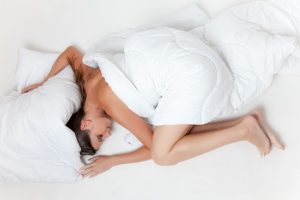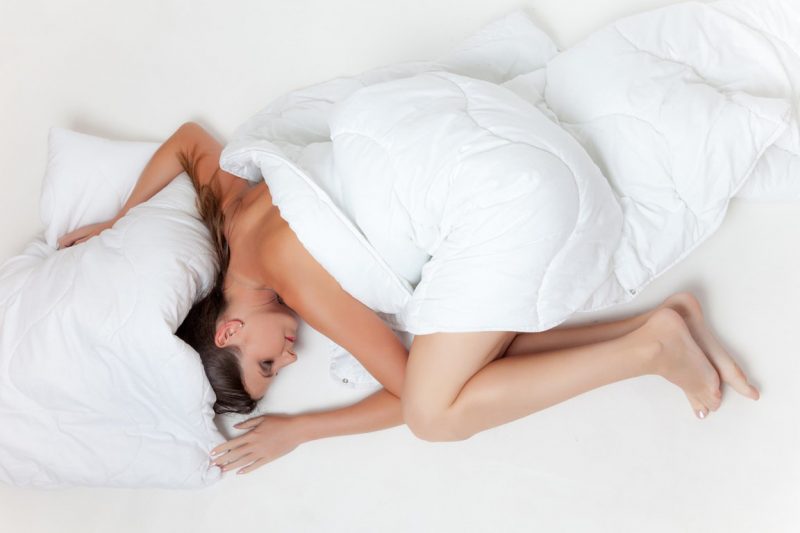 Climbing into a soft, comfortable bed at the end of a long day, pulling up the covers and laying your head on that cozy pillow is one of the most satisfying sensations you can experience.
Climbing into a soft, comfortable bed at the end of a long day, pulling up the covers and laying your head on that cozy pillow is one of the most satisfying sensations you can experience.
Another is waking up after a solid night’s sleep while still cozied up in bed.
One of the most unpleasant experiences, however, is waking up with an arm that has “fallen asleep” or a sore neck from sleeping in the wrong position.
It seems like it takes all day to recover from waking up sore.
Some positions may seem more comfortable than others, but did you know that biomechanically, there is a “right way” to sleep? Your pillow and bed will have an impact as well so let’s break down the logistics of correct sleep positions.
Does all of this really matter?
Let’s start off with the importance of sleep. Scientists have not yet been able to fully understand the need our bodies have for sleep, but it is an essential part of living.
Without sleep, the body begins to lose its ability to function appropriately.
Illness, both physical and mental, can occur with a lack of rest.
Your ability to help yourself and others is severely diminished; in fact, you could become a danger if you do things like drive while you are tired.
There are entire industries that are dedicated to ensuring a “good night’s sleep” for a reason.
Bed and Pillow Talk
 As beds have become more advanced, they are designed with your body’s pressure points in mind.
As beds have become more advanced, they are designed with your body’s pressure points in mind.
The purpose of a bed being so soft is that you can sleep on your side without stressing your body’s pressure points too greatly by allowing some “give”.
The problem is that your body is not intended to last for very long in a position like that.
Unless you are taking some sort of suppressant, like alcohol or sleeping pills, or are very tired, your body responds by tossing and turning, not allowing for quality sleep.
If your body does not move due to a suppressant, then you end up spraining ligaments or pulling muscles, hence waking up sore.
The longer you allow your body to sleep in this manner, the worse your sleep health becomes.
According to chiropractor Dr. Peter Martone, sleeping on your back is the ideal position, but it must be done correctly.
When you lay on your back, it disperses your body weight across the greatest amount of surface area which greatly reduces any stress on your pressure points.
He stresses that sleeping on your stomach or side will damage the spine in a significant way that can have long-lasting effects if not corrected.
Sleeping incorrectly isn’t the only way to cause damage to the spine.
Dr. Martone talks about forward head posture that comes from spending time on a computer, driving or texting as part of what can cause misalignment of the spine.
When you add poor sleep along with poor posture, you end up with poor spinal health that can lead to poor overall health.
The daily poor posture must be counterbalanced by appropriate sleeping methods in order to maintain better health.
Sleep Posture
 Our sleep time is the longest time that we will, most likely, be in one position.
Our sleep time is the longest time that we will, most likely, be in one position.
Because of this fact, the correct position is essential for proper rest and recuperation.
While lying on your back seems to be the best option, it is not always feasible for a variety of reasons.
If this is the case, find the optimal position for you personally, based on comfort and ideal posture.
First, do not sleep on your stomach.
This causes significant pressure on the spine and neck.
Many stomach sleepers do not rotate their head while sleeping which can cause asymmetrical strain leading to pain in the neck and back.
If you are a back-sleeper, make sure you are only using one pillow.
Ideally, this pillow will follow the natural curve of the neck in order to support your cervical spine.
Your pillow should focus on neck support, not head support.
Find a neutral position. The best neutral position is on your back, neck supported, arms resting comfortably at your sides and legs straight.
If you are a side-sleeper, use a pillow that places your head level between your shoulders, not tilted one way or another. Place a pillow between your legs in order to level out your lower spine.
Also be sure to alternate sides.
Sleep on a comfortable mattress.
This will vary from person to person. Look for a mattress that is firm enough to support your body’s spine without being too uncomfortable.
If it is too soft, your hips could sink into the mattress and cause your spine to go out of alignment.
Too hard, and it will be uncomfortable and challenging to get a good rest.
Body type and weight can affect your mattress decision so be sure to try plenty of them before choosing the best one.
How long will it take to become a back sleeper?
If health issues do not prevent it, you should begin to transition towards sleeping on your back, but understand that it will not be an overnight success.
For many, it can take months if you are changing from side sleeping and even longer from stomach sleeping.
A good method would be to lie on your back and try to sleep for about 20 minutes for the first night.
Add ten minutes each night after that to help your body adapt.
It will be uncomfortable, and possibly even a little bit painful, but this pain would be similar to the pain felt when you exercise—it hurts, but it helps.
Some other suggestions to improve the speed of adjusting to back sleeping as well as gaining quality of sleep are as follows:
– If you have sleep apnea, back sleeping may worsen it.
Some suggest using tape to hold your mouth closed, forcing you to breathe out of your nose, but if you aren’t keen on that idea, there are many sleep aids for those with this issue.
-Turn off all electricity in your room. Electric fields can disrupt your sleep cycle by impairing melatonin production.
-Turn off/block any blue light after dark. This includes light from all electronic devices.
When you choose to help yourself through better health, you must consider all areas that could be affecting your overall health.
Sleep is one of these areas. If you have not thought about your sleep positioning before, examine how you sleep and adjust accordingly.
This could be what is preventing you from getting that deep, necessary rest. Thankfully, it can be changed!
If you are struggling to get a good night’s sleep, go to the next page and discover the humming bee technique to fall asleep easily –
About the Author:
Emma Deangela is the best selling author of The Alkaline Diet Program and 80/20 Fat Loss. She has helped over tens of thousands of men and women to lose weight and transform their health with sound nutrition advice. Learn how you can lose weight fast – How to lose weight by adding these alkaline foods.
What is your sleeping position?
Please share with your friends this article on “Best Sleeping Position?” – Use any of the social media and email buttons on the left of our website.


Leave a Reply